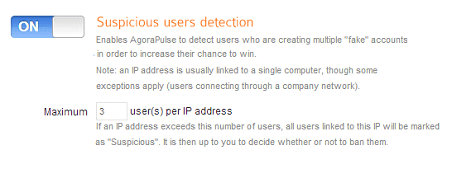Note – this article has been previously published on SocialMediaExaminer’s blog, as a guest post.
Are you thinking of running a contest on Facebook?
Have you run a contest and had little success with retaining fans past the award date?
One goal of a successful Facebook contest should be to recruit fans who are genuinely interested in you, while avoiding the cheaters and faux fans who are only interested in material gain.
In this article you’ll discover five tips to help ensure that your contests attract genuine fans.
#1: Choose the most appropriate Prizes
Don’t offer attractive prizes that have nothing to do with your brand.
Everyone wants an iPad—not just your potential customers. A free vacation will not just attract fans who are interested in your beauty products, but pretty much anyone who sees the contest.
An appropriate award deflects the prize-hunters who hide your posts or unlike your Page as soon as the prizes have been awarded.
Offer a prize that interests your current or future customers. If your contest attracts entries from people who have no reason to become your customer, change it.

Lord & Taylor, an online fashion retailer for women, is awarding fashion accessories from its website.
If you are an airline, offer an award of miles or an upgrade on their next flight to fans who are already members of your loyalty program. If you’re offering trips to resorts, send your winner to one of the destinations in your portfolio. If your business specializes in selling iPads, give away a must-have accessory.
When you choose the right prize, you safeguard against attracting opportunists and cheaters. You may have fewer entrants, but in the long run you’ll be far better off with 100 new potential customers than you are with 1000 scavenger-hunters who go through Facebook competition forums looking for prizes to win.
#2: Choose Your Winners Wisely
Many contests use a system of votes (photo competitions) or point accumulations (quizzes) to identify finalists or winners. These methods animate your campaign, boost engagement and can increase the chances of the contest going viral. But they should never be the only methods used for choosing your winners.
Awarding prizes to photo submissions that have received the most votes or to the highest scorer on your quiz is a sure way to incite cheaters and prize-hunters to distort the rules of your game. They may enroll as fake participants who have no interest in your brand, generate dummy votes or find the correct answers in one of the many online forums about game competitions.
For image-based contests, appoint a jury to choose your winner from a selection of finalists. The number of votes can be taken into consideration, but if the photo in question is found to be faked, they can remove it from consideration.

Choosing a winner based on the most votes runs the risk of encouraging cheaters. Allowing a jury to select the photos is often a secure alternative.
In a quiz framework, select a winner by drawing from the participants who provided correct responses, or a minimum of correct answers.
Add an element of chance to discourage cheaters and unscrupulous participants. There’s no point in going to the trouble of cheating when ultimately the chance of winning is random.
#3: Enforce Identification Using a Facebook App
Some Facebook contests don’t require entrants to accept an app installation on their profile in order to participate. These competition providers feel the install request may reduce the number of participants.
This is untrue. Using a Facebook app install request does not reduce the number of participants significantly.
It’s relatively easy for people to create numerous dummy email accounts. It’s much more challenging and time-consuming for them to create a large number of fake Facebook accounts. Facebook is constantly policing fake accounts and deleting them.
To limit cheaters, use an application specialized for contests that requires people to register and install before participating.
#4: Enable Sharing Options With Care
Rewarding contestants who invite their friends to participate in your contest by entering them in a second random drawing can increase your campaign’s visibility.
This tactic can also increase the risk of attracting participants who have no value to your business.
If your products appeal to a large base of consumers (food, travel, multimedia products, etc.), there’s no reason not to make use of sharing options. But you’ll want to limit this type of engagement if your products are very focused or targeted at a niche audience.

The share options (sharing on Facebook or Twitter, inviting friends) are available on most Facebook applications. These can be great options for wide-ranging products, but niche businesses may be better off without them.
#5: Detect and Ban Potential Cheaters
If you’ve meticulously followed the advice above, you’ve likely avoided creating a playground for cheaters and prize-hunters. But what about the clever few who slip through? You owe it to your genuine contestants to identify scammers.
All entrants leave a personal signature that allows you to identify them: their IP address.
It’s very difficult for opportunists to participate from many different locations or simulate multiple IP addresses.
Choose a contest app that provides native detection functions and fraud management to track IP addresses and detect cheaters.
When all the friends of one participant or all the votes on a photo have the same IP address, you’ll want to ban the identified participants. This is another option your campaign app provider should offer you.
Contests are a good way to grow and reward your audience. The key is to make sure that the community you attract with each contest is genuinely interested in your product or service.
These are a just a few tips that address one aspect of running a successful Facebook contest. Hopefully you’ll see the results you’re looking for—more engaged fans who convert to customers.
What do you think? Have you used any of these tips? What successes have you had with contests? Please leave your questions and comments in the box below.





